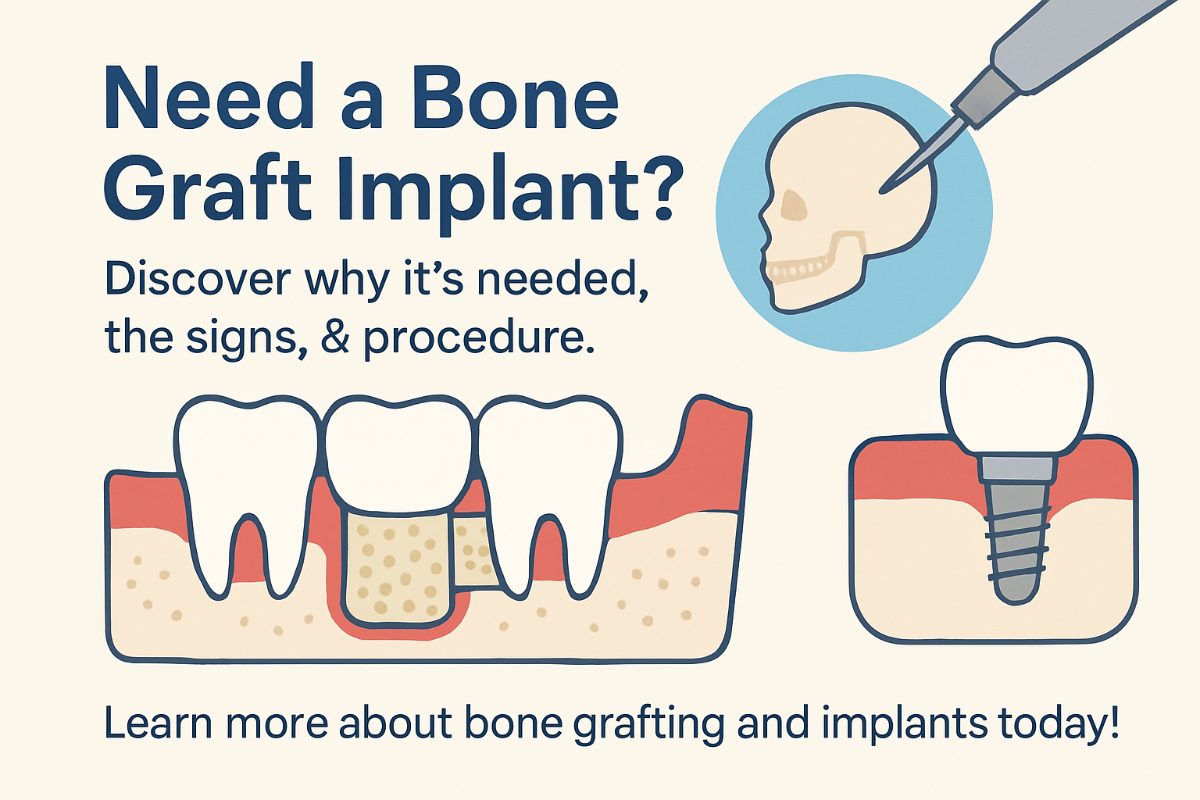A bone graft implant combines bone grafting with dental implant planning to give a stable foundation for a replacement tooth. A bone graft rebuilds lost jawbone so an implant can be placed and held firmly. This post explains why grafting might be needed, signs to watch for, the graft types used with implants, the typical timeline, risks and comfort options, cost basics, and next steps to find out if a bone graft implant is right for you.
Why a Bone Graft Implant May Be Necessary
When a tooth is lost, the jawbone that once supported it can shrink over time. Infection, trauma, or long-term denture wear speeds that bone loss. If there isn’t enough height or width of bone, an implant won’t sit securely. A bone graft implant Flowood, Mississippi is often recommended to rebuild bone so the implant has proper support and long-term stability.
Signs You Might Need a Bone Graft Before an Implant
Visible and functional signs
You may notice a receding jawline, shifting nearby teeth, trouble chewing, or dentures that feel loose. These changes can mean the bone has thinned where an implant would go.
Clinical signs found on imaging
Digital X-rays and CBCT scans show low bone height or narrow bone width, thin bone density, or a sinus that is too close to the upper jaw. These imaging findings tell the dentist if a bone graft implant is required before placing an implant.
Types of Bone Grafts Used With Implants
Autograft (your own bone)
Autografts use bone from another site in your body. They integrate well and have high success rates, but require a second surgical site and healing time.
Allograft, xenograft, and synthetic options
Allografts come from donated human bone, xenografts from animal sources, and synthetics are lab-made. These options avoid a second harvest site, are widely used, and work well for many patients.
Sinus lift and ridge augmentation
A sinus lift raises the sinus floor to add bone in the upper jaw. Ridge augmentation rebuilds lost width or height in the jaw ridge. Both are common when a bone graft implant Flowood patients need more bone for implant placement.
What to Expect: Bone Graft Implant Timeline & Procedure
Before surgery you’ll have a consultation, intraoral scans, and digital imaging to plan grafting and implant placement. The graft surgery places bone or graft material where needed. Healing can take several months for the graft to integrate. After healing, the implant is placed, and later a CAD/CAM crown or implant-supported denture completes the restoration.
Risks, Success Rates, and Comfort During a Bone Graft Implant
Risks include infection, graft failure, and minor complications. Success improves with good oral hygiene, quitting smoking, and careful digital planning. Pain is usually controlled with local anesthesia, oral sedation, nitrous oxide, or IV sedation—options available for comfort during a bone graft implant Flowood patients often choose.
Cost, Insurance, and Financing for a Bone Graft Implant
Adding a graft raises overall implant cost because of extra surgery and healing time. Some dental insurance may cover part of the graft; many practices offer financing plans to spread payments. Ask about estimates that separate graft, implant, and restoration costs.
Why Choose Revive Denture & Implant Studio for Your Bone Graft Implant
Revive Denture & Implant Studio in Flowood offers on-site digital imaging, intraoral scanning, surgical guides, and sedation to plan and place grafts precisely. Dr. Joseph Boone has advanced implant training and experience with complex grafting cases, supporting predictable results and patient comfort.
Next Steps: How to Find Out If You Need a Bone Graft Implant
Schedule a consultation and digital evaluation to review scans and options. Ask to see before/after photos and videos, and talk about financing and sedation choices. A quick exam and CBCT scan will show if a bone graft implant Flowood, Mississippi is needed and outline the best treatment plan for your smile.




